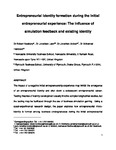Entrepreneurial identity formation during the initial entrepreneurial experience: The influence of simulation feedback and existing identity
| dc.contributor.author | Newbery, R | |
| dc.contributor.author | Lean, Jonathan | |
| dc.contributor.author | Moizer, Jonathan | |
| dc.contributor.author | Haddoud, Mohamed Yacine | |
| dc.date.accessioned | 2017-12-20T10:25:58Z | |
| dc.date.issued | 2018-04 | |
| dc.identifier.issn | 0148-2963 | |
| dc.identifier.issn | 1873-7978 | |
| dc.identifier.uri | http://hdl.handle.net/10026.1/10448 | |
| dc.description.abstract |
© 2017 Elsevier Inc. The impact of a negative initial entrepreneurship experience may inhibit the emergence of an entrepreneurial identity and shut down a subsequent entrepreneurial career. Testing theories of identity development usually involve complex longitudinal studies, but the testing may be facilitated through the use of business simulation gaming. Using a quasi-experimental research design, the paper explores how entrepreneurial micro-identity is formed among business undergraduates during the initial entrepreneurial experience. In doing so, the research investigates the impact of cognitive dissonance on the salience of the emerging identity and the influence of key existing identities. The paper accomplishes this using a novel dataset derived from a business simulation game. We argue that the simulation offers a valuable resource to test theories within shortened timescales. The paper contributes to the field by problematizing the initial entrepreneurial experience of undergraduate students and supports the case for using simulation gaming as a method to support theory testing. | |
| dc.format.extent | 51-59 | |
| dc.language | en | |
| dc.language.iso | en | |
| dc.publisher | Elsevier | |
| dc.subject | Entrepreneurial intent | |
| dc.subject | Entrepreneurial identity | |
| dc.subject | Higher education | |
| dc.subject | Simulation game | |
| dc.subject | Simventure | |
| dc.title | Entrepreneurial identity formation during the initial entrepreneurial experience: The influence of simulation feedback and existing identity | |
| dc.type | journal-article | |
| dc.type | Journal Article | |
| plymouth.author-url | https://www.webofscience.com/api/gateway?GWVersion=2&SrcApp=PARTNER_APP&SrcAuth=LinksAMR&KeyUT=WOS:000428227100005&DestLinkType=FullRecord&DestApp=ALL_WOS&UsrCustomerID=11bb513d99f797142bcfeffcc58ea008 | |
| plymouth.volume | 85 | |
| plymouth.publication-status | Accepted | |
| plymouth.journal | Journal of Business Research | |
| dc.identifier.doi | 10.1016/j.jbusres.2017.12.013 | |
| plymouth.organisational-group | /Plymouth | |
| plymouth.organisational-group | /Plymouth/Faculty of Arts, Humanities and Business | |
| plymouth.organisational-group | /Plymouth/Faculty of Arts, Humanities and Business/Plymouth Business School | |
| plymouth.organisational-group | /Plymouth/REF 2021 Researchers by UoA | |
| plymouth.organisational-group | /Plymouth/REF 2021 Researchers by UoA/UoA17 Business and Management Studies | |
| plymouth.organisational-group | /Plymouth/Users by role | |
| plymouth.organisational-group | /Plymouth/Users by role/Academics | |
| dcterms.dateAccepted | 2017-12-08 | |
| dc.rights.embargodate | 2019-6-19 | |
| dc.identifier.eissn | 1873-7978 | |
| dc.rights.embargoperiod | Not known | |
| rioxxterms.versionofrecord | 10.1016/j.jbusres.2017.12.013 | |
| rioxxterms.licenseref.uri | http://www.rioxx.net/licenses/all-rights-reserved | |
| rioxxterms.licenseref.startdate | 2018-04 | |
| rioxxterms.type | Journal Article/Review |


